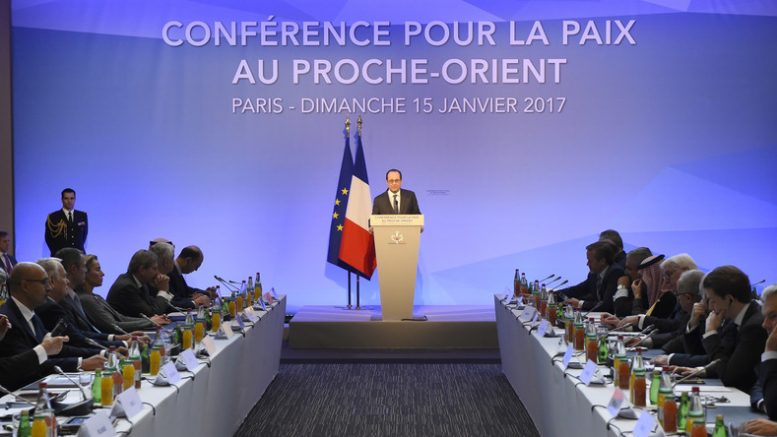January 16th; 2017, “The Guardian”
Meeting to say two-state solution is under threat as Palestinians voice concern about support for settlements in Trump camp.
The international community will send Donald Trump a strong warning that only a two-state solution can solve the Israel-Palestinian crisis, amid signs that the EU is willing to diverge from the US on Israel policy.
A conference in Paris on Sunday of more than 70 countries, organised by the French government and coming five days before Trump is inaugurated, will warn that the two-state solution is under threat and urge both sides in the conflict to resume talks.
It comes as Palestinians expressed concern that Trump advisers endorse the controversial Israeli settlement programme and want to move the US embassy to Jerusalem.
The Palestinian leader, Mahmoud Abbas, has warned that such a symbolic move could derail the peace process.
Netanyahu has called the event futile, rigged and “a relic”, saying: “It’s a last gasp of the past before the future sets in.”
The French had at one point hoped the conference might lead to an agreement for Netanyahu and Abbas to meet, but that is off the table.
Instead, Abbas, pleased with the direction of European diplomacy, will meet the French soon after the conference.
In a statement alongside the conference, the French foreign minister, Jean-Marc Ayrault, defended the initiative. “For more than six years, the absence of a peace process has given way to a deceptive status quo,” he said. “Palestinians are seeing their future state shrinking as settlement expansion continues at an unprecedented speed. This, in turn, generates more occupation, since there is never one without the other.”
The French say the conference, to be addressed by the president, François Hollande, is not just a vital symbolic show of support for a two-state solution, but a chance to set out practical incentives for peace, including aiding Palestinian capacity-building and help for civil society, to promote dialogue.
Despite Israeli objections to the conference, and disapproval from the Trump team, the US secretary of state, John Kerry, will attend, and he is eager for the event not to be dismissed as a swansong for his frustrated efforts to seek peace.
In a move that gave the conference a new relevance, the US broke with precedent in December by refusing to veto a UN security council resolution that condemned Israeli settlements as “illegal and dangerously imperilling the viability of the two-state solution”. The resolution also called on “states in their relevant dealings to distinguish between the territory of the state of Israel and territories occupied since 1967”.
The clause, repeated in the draft Paris communique, has been taken as a green light for campaigns to boycott goods from illegally occupied territory. The EU will meet this week to discuss how the proposal could be developed.
The draft communique, under negotiation over the weekend, also reaffirms existing international resolutions, urges both sides to restate their commitment to a negotiated two-state solution and disavows officials who reject it.
The text urges the protagonists to “refrain from unilateral steps that prejudge the outcome of final status negotiations”.
In a sign that the Obama administration had lost patience with Israel, Kerry followed the UN vote with a lengthy speech on 28 December detailing the scale of settlement activity, and the threat it posed to a contiguous Palestinian state. Describing the Israeli government as the most rightwing in the country’s history, he warned that Israel would never have true peace with the Arab world if it “goes down the path of one state”.
Although Israel has voiced concerns that the Paris conference may be used as a lever for a UN resolution, the more likely theatre for further activity is the EU, including over boycotts of goods generated within occupied territories. More broadly, it may represent the start of a EU foreign policy more independent of Washington.
Britain, caught between its support for a two-state solution and desire to gain traction with the Trump administration, was deciding at what level to attend the conference.
To complicate matters further, the Russians are holding separate meetings in Moscow this week with Palestinian groups.
Trump has pledged to pursue more pro-Israeli policies, but in nomination hearings last week, neither the proposed secretary of state, Rex Tillerson, nor the expected defence secretary, James Mattis, supported moving the embassy from Tel Aviv. But David Friedman, Trump’s choice for ambassador to Israel, has said he looks forward to working “from Israel’s eternal city, Jerusalem”.
A move to Jerusalem would endorse the disputed city as Israel’s capital.

